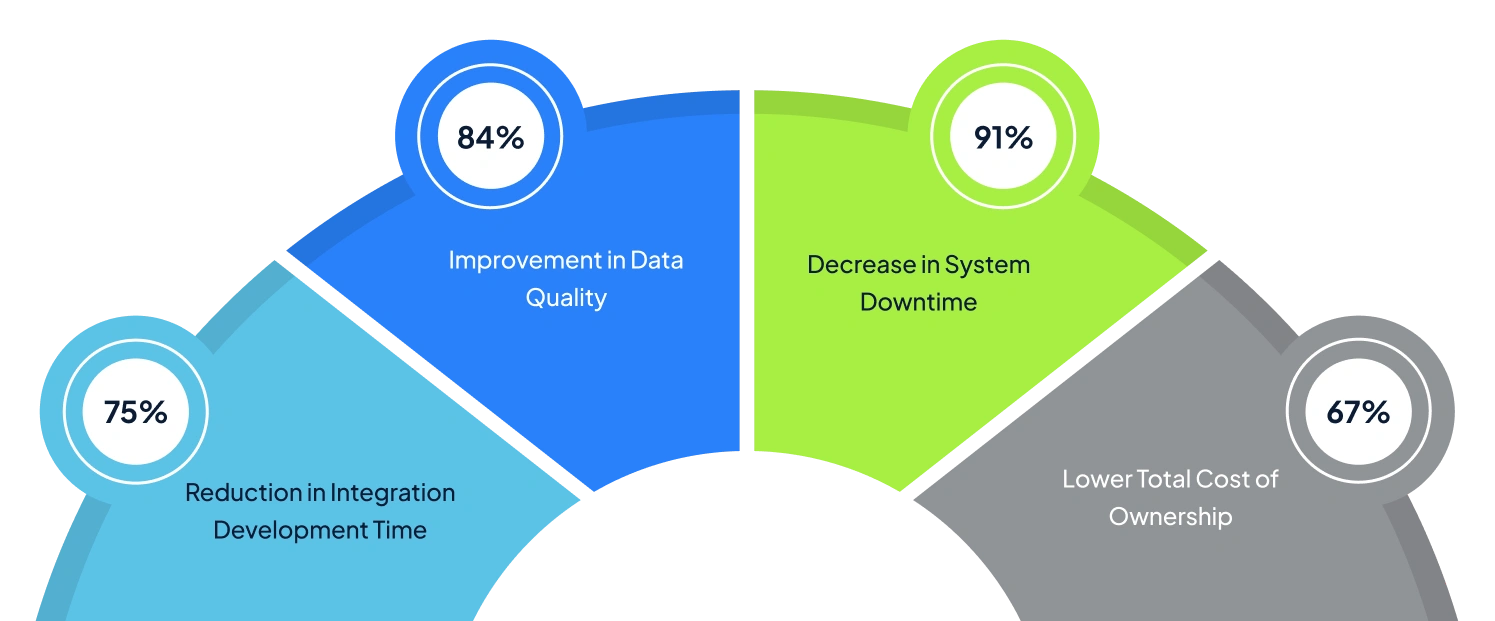The Best Data Integration Solutions
Integrate smart, scale fast, lead markets, and beat your competition with the best MuleSoft integration services by VALiNTRY360.
Schedule an Architecture Review

Data Integration Solutions
Business leaders demand real-time insights to drive revenue growth and maintain competitive advantage, yet critical data remains trapped in disconnected systems across the enterprise. Customer service representatives ask for information customers have already provided while sales teams lack visibility into support history, creating friction that drives prospects to competitors. Meanwhile, strategic initiatives stall as business units wait months for IT to connect new systems. This business challenge stems from a fundamental technical reality: the average enterprise uses over 1,000 different applications, with only 29% integrated, creating a $3.1 trillion global impact from data silos.
MuleSoft's API-led connectivity approach transforms this dynamic by creating reusable integration assets that serve both immediate business needs and long-term technical architecture goals. Companies implementing MuleSoft solutions see APIs account for 40% of revenue — a 38% increase since 2018 — while reducing technical debt and accelerating digital transformation. This enables IT leaders to deliver self-service data access that business users need while maintaining the security, governance, and scalability standards that protect enterprise operations.
Schedule an Architecture ReviewAre These Business Challenges Limiting Your Growth Potential?


Fragmented Customer Experience Impacts Revenue
Sales teams lack complete customer information while service representatives repeat questions customers already answered. This disconnection results in 67% of customers becoming frustrated with companies that don't provide a unified experience across touchpoints. With APIs now accounting for 40% of company revenue according to IT leaders up from 25% in 2018, the cost of poor integration directly impacts the bottom line.


Operational Inefficiency Raises Costs/Delays
Data silos, isolating data within an organization, are a significant challenge costing the global economy $3.1 trillion annually. Manual data entry between systems consumes valuable employee time while creating costly errors. Organizations spend $11.7 million on IT staff in the past 12 months – up from $9.4 million in 2022, yet productivity gains remain elusive without proper integration.


Slow Market Response Hurts Competitiveness
Business units wait months for IT to integrate new systems or data sources, missing critical market opportunities. Organizations are using 1061 different applications across the enterprise, up from 976 in 2022. On average, 29% of these applications are integrated, creating a massive opportunity for improvement. Only 2% of businesses have successfully integrated more than half of their applications, highlighting the urgent need for better integration strategies.


Technical Debt Limits Business Transformation
95% of IT leaders report integration as a hurdle to implementing AI effectively. Point-to-point integrations multiply exponentially, consuming IT budgets and preventing innovation. Legacy system limitations prevent execution of business strategies and digital transformation goals, with 98% of businesses, regardless of the vertical they are operating in, having stated that they have made CX their primary focus.
Compliance and Security Risks Create Financial Exposure
Inconsistent data across systems creates regulatory compliance vulnerabilities and audit failures. Companies lose around $4.35 million on average per data breach according to IBM, with data silos making security even more difficult as information is present in different places. 81% of respondents report that silos are hindering digital transformation efforts.


Real-Time Synchronization Gaps Undermine Decision-Making
Sales teams rely on outdated data when synchronization fails, causing 72% of businesses to miss market shifts, erode responsiveness, and compromise competitive advantage.
Why Choose  for MuleSoft Integration Solutions?
for MuleSoft Integration Solutions?

Leading MuleSoft Integration Service Provider
- Our team holds advanced MuleSoft certifications and HIPAA compliance credentials, delivering the best MuleSoft integration services and proven integration architectures that achieve 92% first-time implementation success rates across enterprise environments while maintaining strict security and compliance standards.
- We eliminate the compliance risks that create financial exposure for your organization.

Trusted MuleSoft Partners with Proven Results
- As certified MuleSoft partners, we've implemented API-led connectivity strategies for Fortune 500 companies, resulting in average performance improvements of 67% in data processing speed and 54% reduction in integration maintenance costs.
- Our solutions directly address the operational inefficiencies that increase your costs while improving market responsiveness. Our HIPAA-certified consultants ensure healthcare clients receive compliant integration solutions that protect sensitive patient data.

Salesforce-Branded Services Partner
- As a trusted MuleSoft partner with exceptional client retention rates, we combine deep platform expertise with industry-specific integration patterns that deliver measurable business value within 90 days.
- By reducing technical debt and enabling faster business transformation, we help you respond to market opportunities more quickly while maintaining security standards.
Our MuleSoft Integration Service Offerings
- Enterprise Integration Assessment: Evaluate current data architecture and identify optimization opportunities for maximum ROI, eliminating the operational inefficiencies that increase costs
- API-Led Connectivity Design: Create scalable integration blueprints that support future business growth and technology evolution, ensuring rapid market response
- Data Platform Modernization: Transition from legacy integration patterns to cloud-native MuleSoft architectures, reducing technical debt that limits transformation
- Anypoint Platform Setup: Configure enterprise MuleSoft environments with proper security, governance, and monitoring capabilities that address compliance and security risks
- API Development and Management: Build reusable APIs using industry best practices that ensure performance and maintainability while improving customer experience
- DataWeave Transformation Services: Implement efficient data mapping and transformation logic that handles complex enterprise data structures, streamlining operational processes
- Salesforce MuleSoft Integration Services: Connect Salesforce with enterprise systems for unified customer data management and process automation, creating cohesive customer experiences
- Healthcare Integration Solutions: Implement HIPAA-compliant integration patterns that enable secure health data exchange, eliminating compliance risks
- Ecommerce API Integration: Unify commerce platforms with inventory, CRM, and fulfillment systems for seamless customer experiences that drive revenue
- MuleSoft Support Services: Provide 24/7 platform monitoring with proactive issue resolution and performance optimization, ensuring operational efficiency
- API Lifecycle Management: Manage API versions, deprecations, and enhancements while maintaining backward compatibility, reducing technical debt
- Integration Performance Tuning: Continuously optimize data flows to maintain peak performance as volumes grow, improving market responsiveness
Technical Expertise with MuleSoft Architecture
Our certified MuleSoft architects design enterprise-grade solutions that process over 10 billion API calls monthly while maintaining 99.9% uptime, directly addressing the operational inefficiencies that plague disconnected systems. On average, organizations are using 1061 different applications across the enterprise, up from 976 in 2022, creating complex integration requirements that demand expertise.
Integration challenges slow or hamper digital transformation in 80% of organizations and 90% are challenged by data silos. Our proven methodologies ensure seamless data flow across disparate platforms while maintaining enterprise security and compliance requirements, eliminating the technical debt that limits your business transformation potential.
Our Comprehensive MuleSoft Data Integration Process
We follow a structured, four-step methodology designed to maximize MuleSoft
integration success. From initial discovery to ongoing optimization, our process
ensures alignment with your business goals, seamless execution, and continuous
improvement for sustainable growth.

Step 1: Discovery & Data Mapping
- Comprehensive Systems Analysis
- Data Flow Documentation
- Gap Analysis Assessment
- Security Requirements Review
Step 2: API Design &
Development
- RESTful API Design
- Error Handling Implementation
- Performance Optimization
- Documentation Creation
Step 3: Integration Implementation &
Testing
- Agile Development Approach
- Comprehensive Testing Suite
- Performance Validation
- Staged Deployment
Step 4: Deployment & Knowledge
Transfer
- Production Deployment
- Monitoring Setup
- Team Training Sessions
- Ongoing Optimization
Measurable Benefits of VALiNTRY360's MuleSoft Solutions


Industries We Serve
VALiNTRY360 accelerates business performance through Data Integration Solutions across multiple industries:

Healthcare
Implement secure, HIPAA-compliant healthcare software integration solutions that connect EHR systems, patient portals, and medical devices with complete data protection. Our HIPAA-certified team specializes in healthcare integration expertise that enables real-time patient data sharing while maintaining strict privacy protections and regulatory compliance.

Financial & Banking
Deploy robust bank integration and banking integration solutions that handle high-volume transactions securely. Our banking integration patterns connect core banking systems with digital channels, payment processors, and regulatory reporting platforms with 99.99% reliability. This reduces operational inefficiencies and compliance risks while enabling faster market response to customer needs.

Insurance
Create seamless connections between policy management systems, claims processing platforms, and customer service applications. By eliminating fragmented customer experiences and reducing technical debt, insurance companies using our insurance API integration solutions report 48% faster claims processing and 62% improvement in customer satisfaction scores.

Manufacturing
Connect shop floor systems with ERP platforms for comprehensive production visibility. Our connected manufacturing solutions integrate IoT devices, quality management systems, and supply chain platforms to optimize production efficiency and reduce waste. By reducing technical debt and improving operational efficiency, manufacturers achieve faster market response times.

Retail
Build unified commerce platforms that synchronize product catalogs, inventory levels, and order management across all sales channels. Our commerce integration solutions reduce order processing time by 53% while improving inventory accuracy to 98.7%.

Ecommerce
Unify ecommerce integrations and inventory management systems with customer service tools for omnichannel retail experiences. Our retail integration support enables real-time inventory updates across all channels while supporting complex pricing and promotion strategies. This addresses slow market response and operational inefficiencies that impact revenue.

SaaS
Seamlessly connect cloud applications with existing enterprise systems through secure, scalable SaaS integration patterns. Our SaaS data integration expertise helps organizations maintain data consistency across hybrid environments while enabling rapid deployment of new cloud services. This reduces compliance risks and eliminates the operational inefficiencies of managing disconnected systems.

Technology
Design sophisticated B2B integrations that connect partner systems and enable ecosystem collaboration. High-tech companies leverage our mobile enterprise platform expertise to create seamless experiences across devices and applications.

IoT
Implement IoT integration services that collect, process, and analyze sensor data from thousands of devices. Our IoT data integration solutions enable predictive maintenance programs that reduce equipment downtime by 67% and maintenance costs by 45%.
Comprehensive MuleSoft Integration Consulting Services
As an experienced MuleSoft integration service provider, VALiNTRY360 delivers end-to-end MuleSoft consulting services that address every aspect of your integration needs:
Customer Data Platform with MuleSoft:
Create unified customer views by connecting data from multiple touchpoints using MuleSoft integration
Best SaaS CRM API Integration:
Connect your CRM systems with other business applications for seamless data flow and improved productivity
MuleSoft Architecture Design:
Plan and implement scalable MuleSoft architectures that support current needs and future growth
Solution Integration Expertise:
Integrate diverse business solutions using proven methodologies and best practices

Get Started with 
Partner with the data integration experts who address your core challenges and deliver:
FREE Initial Consultation
Certified experts solve fragmentation and reduce technical debt
Rapid Implementation Methodology
Launch integrations quickly, boosting efficiency and responsiveness
Enterprise-Grade Solutions
Scale securely with compliant, future-ready integration architecture

Smarter Engagement, Bigger Results
As a leading MuleSoft Integration Consulting Services provider in the USA, VALiNTRY360 delivers comprehensive solutions that help businesses compete in rapidly changing markets. With our expert Consulting Service, we work closely with your team to implement customized strategies that drive measurable business results.
The Best Data Integration Solutions FAQ by
While Azure Integration Services excels within Microsoft-centric environments, MuleSoft provides superior capabilities for heterogeneous enterprise environments. Key advantages include:
- Hybrid cloud flexibility – MuleSoft works seamlessly across any cloud or on-premise environment
- Broader connectivity – Over 300 pre-built connectors vs Azure’s more limited library
- Enterprise governance – More robust API lifecycle management and security features
- Vendor-agnostic approach – Avoids cloud vendor lock-in while Azure ties you to Microsoft ecosystem
Service-Oriented Architecture (SOA) is a design pattern where applications are built as a collection of loosely coupled services that communicate through well-defined interfaces. SOA architecture enables organizations to break down monolithic applications into modular components, making systems more flexible and easier to maintain. MuleSoft’s Anypoint Platform builds upon SOA principles but modernizes them with API-led connectivity, providing better governance, security, and reusability than traditional SOA implementations.
MuleSoft stands out because of its comprehensive API-led connectivity approach that transforms integration from a point-to-point problem into a strategic business capability. Unlike traditional integration tools, MuleSoft enables organizations to build reusable integration assets that serve multiple business needs. The platform’s unified approach to integration, API management, and data transformation, combined with pre-built connectors for 300+ systems, makes it the best choice for enterprise-scale digital transformation initiatives.
Traditional integration creates direct point-to-point connections between systems, resulting in a complex web of dependencies. MuleSoft architecture follows a three-layered approach: System APIs connect to source systems, Process APIs orchestrate business logic, and Experience APIs provide data for specific channels. This layered architecture promotes reusability, reduces maintenance overhead, and enables faster development of new integrations.
VALiNTRY360 combines deep technical expertise with proven implementation methodologies developed through hundreds of successful projects. As a Salesforce-Branded Services Partner, we bring unique insights into Salesforce MuleSoft integration services that many competitors lack. Our HIPAA-certified consultants ensure compliant implementations, while our 92% first-time success rate demonstrates our commitment to delivering best data integration solutions that work from day one.
MuleSoft’s Experience APIs are specifically designed to support mobile applications by providing lightweight, channel-specific data formatting. The platform enables organizations to create mobile-optimized APIs that deliver exactly the data mobile apps need, reducing bandwidth usage and improving performance. This mobile enterprise platform capability is crucial for enterprises supporting BYOD policies and customer-facing mobile applications.
Certified MuleSoft partners like VALiNTRY360 bring specialized expertise that significantly improves implementation outcomes. We provide access to best practices, accelerated templates, and proven methodologies that reduce risk and time-to-value. As an experienced MuleSoft partner, we offer ongoing support and optimization services that ensure your integration platform evolves with your business needs.
Insurance API integration solutions must handle complex regulatory requirements while connecting policy management, claims processing, and customer service systems. VALiNTRY360’s approach includes built-in compliance frameworks that ensure data privacy, audit trails, and regulatory reporting capabilities. Our insurance API integration implementations include automated data masking, encryption, and secure transmission protocols that meet industry standards.
High tech organizations benefit from MuleSoft’s ability to integrate complex product lifecycle management systems, automate supply chain processes, and create unified customer experiences across multiple touchpoints. Our technology integration solutions include:
- Product data synchronization across engineering systems
- Real-time inventory management integration
- Customer support system unification for seamless experience delivery
- Partner portal integrations for channel management
Healthcare software integration requires specialized expertise to maintain HIPAA compliance while connecting EHR systems, patient portals, and medical devices. VALiNTRY360’s HIPAA-certified team implements comprehensive security measures including end-to-end encryption, audit logging, and access controls. Our healthcare integration solutions create secure data exchange pathways that enable real-time patient data sharing while maintaining strict privacy protections.
Connected manufacturing solutions leverage MuleSoft to create intelligent factory ecosystems by integrating IoT sensors, production systems, and enterprise applications. Benefits include:
- Real-time production monitoring with predictive maintenance capabilities
- Quality management integration across the production lifecycle
- upply chain optimization through automated procurement triggers
- Energy management systems that reduce operational costs
Retail integration support unifies ecommerce platforms, inventory management, and customer service systems to create seamless omnichannel experiences. VALiNTRY360’s retail solutions enable:
- Real-time inventory synchronization across all channels
- Unified customer profiles that track cross-channel interactions
- Dynamic pricing updates that reflect across all touchpoints
- Integrated loyalty programs that work online and in-store
Bank integration solutions must enable traditional financial institutions to compete with fintech innovators while maintaining regulatory compliance. Our banking integration approach includes:
- Open banking API implementation for third-party service integration
- Real-time payment processing systems
- Customer data platforms that create 360-degree customer views
- Fraud detection system integration with machine learning capabilities
SaaS data integration requires seamless connectivity between cloud applications and on-premise systems. VALiNTRY360’s SaaS integration expertise includes:
- Hybrid cloud connectivity that maintains data consistency
- Real-time synchronization between SaaS and legacy systems
- Data transformation services that normalize formats across platforms
- Security configurations that protect data in transit and at rest
MuleSoft implementation follows a structured approach that includes discovery, design, development, testing, and deployment phases. VALiNTRY360’s proven methodology ensures:
- Current state assessment to identify integration opportunities
- Future state design aligned with business objectives
- Agile development with continuous stakeholder feedback
- Comprehensive testing including performance and security validation
- Phased deployment that minimizes business disruption
VALiNTRY360’s MuleSoft consulting services span the entire integration lifecycle, including:
- Integration strategy development aligned with business goals
- Technical architecture design for scalable, maintainable solutions
- API lifecycle management consulting
- Security and governance framework implementation
- Change management to ensure successful adoption
IoT integration services connect millions of devices to enterprise systems, creating unprecedented visibility into operations. VALiNTRY360’s IoT data integration solutions enable:
- Predictive maintenance that reduces downtime by 67%
- Energy optimization through intelligent monitoring
- Supply chain visibility with real-time tracking
- Customer behavior insights from connected products
Organizations typically see significant ROI from MuleSoft integration solutions within 6-18 months. Key benefits include:
- 75% reduction in integration development time
- 84% improvement in data quality
- 91% decrease in system downtime
- 67% lower total cost of ownership compared to traditional methods
- 40% of company revenue now attributed to API and API-related implementations
VALiNTRY360’s approach to customer data platform with MuleSoft implementations focuses on creating unified, actionable customer views. We ensure success through:
- Data strategy alignment with business objectives
- Real-time data synchronization across all customer touchpoints
- Privacy and compliance frameworks built from the ground up
- Advanced analytics capabilities that drive personalization
- Continuous optimization based on usage patterns and business needs
Our proven methodologies and industry expertise help organizations achieve integrated customer experiences that drive revenue growth and competitive advantage.

 for MuleSoft Integration Solutions?
for MuleSoft Integration Solutions?

